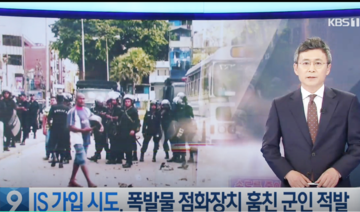SEOUL: South Korea is becoming increasingly vulnerable to “lone wolf” attacks associated with international terror groups, security experts have warned.
Friday’s claim followed the arrest of a 23-year-old South Korean national on suspicion of plotting acts of terrorism with alleged links to Daesh militants while carrying out his mandatory military service.
“This is a distinct case of potential ‘lone wolf’ terrorism in this country,” Kim Dae-young, a security analyst at the Korea Research Institute for National Strategy, told Arab News.
“There is evidence that the suspect was methodically planning acts of terror before and during his military service, with alleged connection to Daesh militants. This is the first case of an enlisted soldier being arrested on suspicion of potential terror activities.”
According to joint investigations by the police and military, the suspect, identified only by his surname Park, was arrested in May while serving with an army engineering unit.
In October 2017, Park was investigated for stealing at least one electric fuse for explosives while participating in a special training session on demolition techniques. But he was not arrested at the time after arguing he was just curious about the military device.
However, police later received intelligence from the US Federal Bureau of Investigation revealing that Park had access to Daesh’s propaganda outlet, Amaq News Agency.
“Police requested the military for assistance with Park’s investigation in May,” a spokesman for the South Korean Ministry of National Defense told reporters. “He is charged with stealing military equipment and violating the anti-terrorism act.”
There is evidence that the suspect was methodically planning acts of terror before and during his military service.
Security analyst Kim Dae-young
Investigators found a video clip on Park’s mobile phone showing how to make homemade ammunition, and at his home seized a machete similar to broad-blade knives commonly used by terrorists, the spokesman said.
“We’ve also collected video clips of Daesh operations and other materials related to acts of terror that Park had posted online since 2016. He is also suspected of having exchanged emails with Daesh militants on how to join the group through a secretive smartphone app,” the spokesman added.
The Criminal Investigation Command, affiliated to the Ministry of National Defense, referred Park’s case to the prosecution on July 1, the day before he was released from the Army after two years’ service.
“Park will be investigated by the civilian prosecution over his alleged violation of the terrorism act, while military prosecutors will keep probe on the ulterior motive of his theft of the electric fuse,” the spokesman said.
If the allegations are found to be true, Park would be the first South Korean national to be punished under the country’s anti-terrorism act since it came into force in March 2016. The law, which carries a sentence of up to five years in prison, was first proposed in 2001 following the September 11 terror attacks in the US with the aim of protecting citizens and public security by monitoring potential terror suspects.
The first person punished under the law was a Syrian, on a humanitarian stay visa in South Korea, who was accused of having recommended other foreign workers, including Iraqis, to join Daesh militants by showing propaganda videos of Islamic extremists.
Lee Man-jong, head of the Korean Association of Terrorism Studies, said South Korea should brace itself for potential terror attacks, although the global allure of Daesh had diminished to an extent.
“South Korea has been relatively safe in terms of terrorism, but we can’t be relaxed since terrorists could target the country at some time,” Lee told Arab News, referring to a UN Security Council report released earlier this year warning that hundreds of Uzbeks linked to terrorist networks could have entered the country.
The report on Daesh and Al-Qaeda stated that members of the Katibat Imam Al-Bukhari and Katibat Al-Tawhid wal Jihad groups had requested entry to South Korea via Turkey, as the militants chose the south due to the large Uzbek community already living there.
“The growing number of multi-cultural families, mostly from Islamic Southeast Asian nations, could be a chance for militant groups to smuggle into the country,” he added.
“Most importantly, South Korea is one of the staunchest allies of the United States and has participated in US-led anti-terror wars in the Middle East, which could be a reason for potential terrorist attacks.”
In 2015, a 17-year-old South Korean, identified only as Kim, disappeared after telling family he was going to study in Turkey. Authorities suspect he made his way into Syria to try and join Daesh.
Although police could not confirm he linked up with the terror group, they found evidence of his interest in the Islamic militants on his Twitter account. The teenager had posted a picture of a Daesh flag and frequently tweeted, “I want to join” while asking to meet “brothers.” He had followed pro-Daesh accounts and often retweeted the group’s propaganda.














